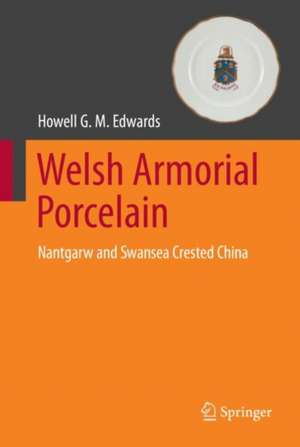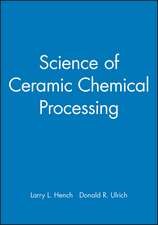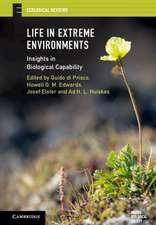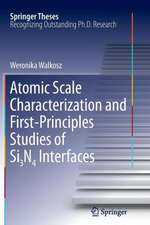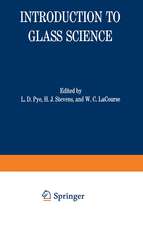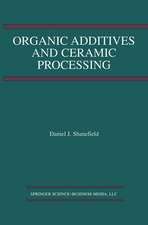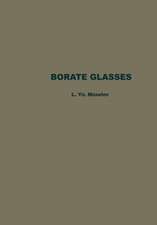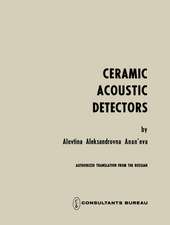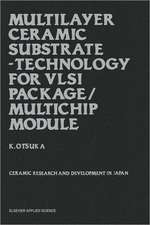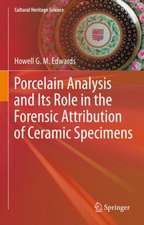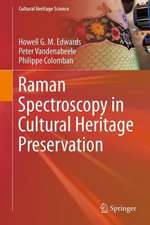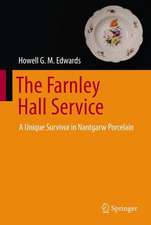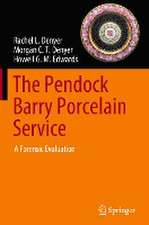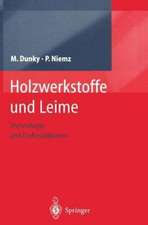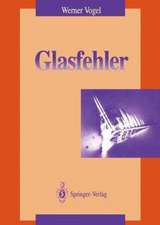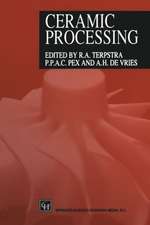Welsh Armorial Porcelain: Nantgarw and Swansea Crested China
Autor Howell G. M. Edwardsen Limba Engleză Hardback – 6 mai 2022
| Toate formatele și edițiile | Preț | Express |
|---|---|---|
| Paperback (1) | 839.76 lei 38-44 zile | |
| Springer International Publishing – 7 mai 2023 | 839.76 lei 38-44 zile | |
| Hardback (1) | 1016.81 lei 3-5 săpt. | |
| Springer International Publishing – 6 mai 2022 | 1016.81 lei 3-5 săpt. |
Preț: 1016.81 lei
Preț vechi: 1240.01 lei
-18% Nou
Puncte Express: 1525
Preț estimativ în valută:
194.56€ • 203.69$ • 160.99£
194.56€ • 203.69$ • 160.99£
Carte disponibilă
Livrare economică 15-29 martie
Preluare comenzi: 021 569.72.76
Specificații
ISBN-13: 9783030974381
ISBN-10: 3030974383
Pagini: 352
Ilustrații: LVI, 352 p. 1 illus.
Dimensiuni: 155 x 235 x 28 mm
Greutate: 0.93 kg
Ediția:1st ed. 2022
Editura: Springer International Publishing
Colecția Springer
Locul publicării:Cham, Switzerland
ISBN-10: 3030974383
Pagini: 352
Ilustrații: LVI, 352 p. 1 illus.
Dimensiuni: 155 x 235 x 28 mm
Greutate: 0.93 kg
Ediția:1st ed. 2022
Editura: Springer International Publishing
Colecția Springer
Locul publicării:Cham, Switzerland
Cuprins
Dedication and Acknowledgements.- About the Author.- Preface.- Chapter 1: The Birth of the Porcelain Trade with China.- Chapter 2: Heraldic Achievements.- Chapter 3 : History of China Production at Swansea and Nantgarw.- Chapter 4: Nantgarw Armorial Porcelain.- Chapter 5 : Swansea Armorial Porcelain.- Chapter 6 : Resume of the Current Situation with Nantgarw and Swansea Porcelain Armorials.- Chapter 7 : A New Approach.- Chapter 8: Summary and Conclusions.- Appendices.- Glossary.- Index.- List of Figures.- List of Tables.
Notă biografică
Howell Edwards was born in Skewen, South Wales, and is Professor Emeritus of Molecular Spectroscopy at the University of Bradford. He read Chemistry at Jesus College in the University of Oxford and after completing his B.A. and B.Sc. degrees he studied for his doctorate in Raman spectroscopy at Oxford with Dr Leonard Woodward and then became a Research Fellow at Jesus College, University of Cambridge, where he worked with Dr Jeremy Jones. He joined the University of Bradford as a Lecturer in Structural and Inorganic Chemistry, becoming Head of the Department of Chemical and Forensic Sciences and he was awarded a Personal Chair in Molecular Spectroscopy in 1996. He has received several international awards (Sir Harold Thompson Award; Charles Mann Award; Emanuel Boricky Medal; Norman Sheppard Award) in a spectroscopic career which has resulted in the publication of over 1320 research papers in Raman spectroscopy and the characterisation of materials, along with six books on the application of this analytical technique to art, archaeology and forensic science. He has had a lifelong interest in the porcelains of William Billingsley, especially those from the Derby, Nantgarw and Swansea china factories. He has authored five major books on Nantgarw and Swansea Porcelains : Swansea and Nantgarw Porcelains: A Scientific Reappraisal, Nantgarw and Swansea Porcelains: An Analytical Perspective , Porcelain to Silica Bricks: The Extreme Ceramics of William Weston Young, 1776-1847 , 18th and 19th Century Porcelain Analysis: A Forensic Provenancing Assessment and Porcelain Analysis and Its Role in the Forensic Attribution of Ceramic Specimens , all published by Springer-Nature Publishing , Dordrecht, The Netherlands . He has also produced several monographs on these manufactories: William Billingsley - The Enigmatic Porcelain Artist, Decorator and Manufacturer;Nantgarw Porcelain - The Pursuit of Perfection ; Swansea Porcelain - the Duck-Egg Translucent Vision of Lewis Dillwyn and Derby Porcelain: The Golden Years,1780-1830. He is currently preparing a text for publication in 2021 on Raman Spectroscopy in the Preservation of Cultural Heritage, for which porcelain artefacts will feature as artworks and a vital part of a nation’s heritage, as does the industrial archaeology, excavation and the preservation of early porcelain manufactory sites. Howell Edwards is Honorary Scientific Adviser to the de Brecy Trust on the scientific evaluation of their artworks and paintings and is a Friend of the Nantgarw China Works Museum Trust.
Textul de pe ultima copertă
Armorial porcelains comprised the output of most European ceramics factories in the 18th and 19th Centuries in response to the large quantity of armorial porcelain services that were being imported from China bearing the coats of arms and crests of aristocratic families. Whereas these armorial services have been identified and covered for most porcelain manufactories the information relevant to their production by the two relatively short-lived Nantgarw and Swansea China Works has not been addressed as a theme until now. As an integral component of the holistic forensic appraisal of porcelain, a functional and decorative artwork manifestly part of our cultural heritage and its ongoing preservation , the recording and identification of such artefacts is material for the future establishment of a database of factory production . The Nantgarw and Swansea factories only operated for a limited period in the second decade of the 19th Century and their porcelains were much appreciated for their high quality and desirability by Georgian households. Today, examples are to be found in many museums and ceramics collections and continue to excite the interest of specialists and the general public . This text provides the first comprehensive assessment of armorial porcelains from these two factories and the methodology and procedure for the identification of unknown armorial bearings and crests is illustrated; individual bearings are discussed in detail and existing incorrect assignments in the literature are re-appraised. The difficulties in attribution of armorial heraldic achievements that are only minimally depicted are considered and directions for further studies using historical documentation are invoked. This book therefore fills a currently existing gap in the ceramics literature of the 19th Century.
Caracteristici
First detailed coverage of armorial porcelains for the Nantgarw and Swansea manufactories Comprehensive coverage and illustration of all currently known exemplars Critical evaluation of the pitfalls in the identification process
